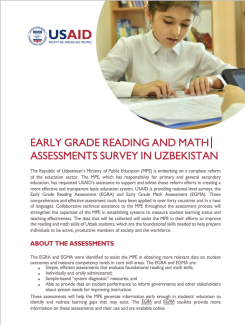The Republic of Uzbekistan’s Ministry of Public Education (MPE) is embarking on a complete reform of the education sector. The MPE, which has responsibility for primary and general secondary education, has requested USAID’s assistance to support and advise those reform efforts in creating a more effective and transparent basic education system. USAID is providing national level surveys, the Early Grade Reading Assessment (EGRA) and Early Grade Math Assessment (EGMA). These comprehensive and effective assessment tools have been applied in over forty countries and in a host of languages. Collaborative technical assistance to the MPE throughout the assessment process will strengthen the capacities of the MPE in establishing systems to measure student learning status and teaching effectiveness. The data that will be collected will assist the MPE in their efforts to improve the reading and math skills of Uzbek students, which are the foundational skills needed to help prepare individuals to be active, productive members of society and the workforce.
ABOUT THE ASSESSMENTS
The EGRA and EGMA were identified to assist the MPE in obtaining more relevant data on student outcomes and measure competency levels in core skill areas. The EGRA and EGMA are:
- Simple, efficient assessments that evaluate foundational reading and math skills;
- Individually and orally administered;
- Sample-based “system diagnostic” measures; and
- Able to provide data on student performance to inform governments and other stakeholders about system needs for improving instruction.
These assessments will help the MPE generate information early enough in students’ education to identify and redress learning gaps that may exist. The EGRA and EGMA toolkits provide more information on these assessments and their use and are available online.
NATIONAL SURVEY ADAPTATION AND DESIGN
The national survey aims to sample and assess over 11,000 Grade 2 and Grade 4 students across Uzbekistan. Reading performance will be measured for all languages of instruction based on students’ first language (Uzbek, Russian, Karakalpak, Kazakh, Tajik, Kyrgyz, or Turkmen). In addition, students can be assessed in Uzbek as a second language, as well as in English. The sample includes 50 schools per region and results can be disaggregated by each region and urbanicity.
The Grade 2 and Grade 4 EGRA, and the Grade 2 EGMA instruments are designed to be administered as oral, individual assessments. The Grade 4 EGMA is designed as a written assessment allowing students to complete the assessment at their own pace. The tables below provide an overview of EGRA and EGMA subtasks by grade.
Overview of EGRA/EGMA Subtasks by Grade
Language | Grade 2 EGRA | Grade 4 EGRA |
Assessed in their 1st Language (L1) | -Letters -Nonwords -Oral Reading with Comprehension | -Nonwords -Oral Reading with Comprehension -Silent Reading with Comprehension |
Assessed in their 2nd language (L2 Uzbek) | -Nonwords -Oral Reading with Comprehension | -Oral Reading with Comprehension -Silent Reading with Comprehension |
Assessed in English | n/a | -Oral Reading with Comprehension -Vocabulary |
Language | Grade 2 EGMA | Grade 4 Math |
Instructions given in language of instruction | -Quantity Discrimination -Missing Number -Addition/Subtraction -Word Problems -Relational Reasoning -Spatial Structuring 2D/3D | -Numbers and Expressions -Fractions -Geometry -Measurement -Statistics |
NEXT STEPS
The global pandemic has affected the timeline for the National Survey, originally scheduled for May 2020. The outbreak of COVID-19 and the uncertainty of school operations has forced postponement of the survey to Spring 2021. A National Policy Dialogue and Dissemination event is planned to follow the National Survey report.

